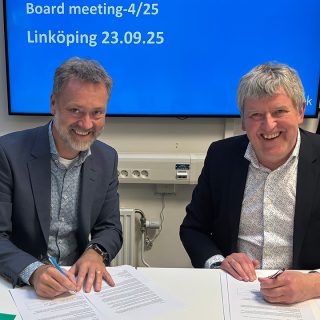Estonia is recognized as a pioneer in public sector digitalization, known for its lean and efficient e-services. However, the private sector presents a contrasting picture: Estonia lags behind in the digitalization of industry and services compared to other European countries. Several factors contribute to this, including low labor costs within the EU, which reduce the economic feasibility of automation investments. Another significant reason is the lack of digital knowledge and skills among company owners and managers, who are expected to lead digital transformations in their organizations.
TalTech’s master’s program is specifically designed to address this gap by targeting leaders and managers. “Our universities produce IT specialists who work in Estonian companies and possess the technical skills needed for digital transformation—software architects, business architects, e-service designers, developers, and IT administrators,” explains the program manager, Kristjan Rebane. “However, these individuals are not typically found in boardrooms making strategic decisions. While they may advise managers on what needs to be done, the managers often lack the expertise to make and execute these decisions without the appropriate education.”
The program is therefore aimed at top and mid-level managers in companies, as well as professionals from the public sector and NGOs. Graduates leave the university equipped with a master’s degree and the expertise to digitize business processes, services, and production. Each year, about 50 new students are admitted, with more candidates applying than the program can accept. The class size is deliberately kept small to ensure personalized attention and foster interaction among participants. These interactions, reflections, and discussions are highly valued aspects of the program, providing students with not just an education, but also a professional network that will benefit them throughout their careers.
Designing a course for well-educated and demanding professionals from diverse backgrounds has been one of the biggest challenges, explains Kristjan Rebane. A mid-level manager seeking education in digital transformation may already hold a master’s degree in fields as varied as agronomy, banking, medicine, computer engineering, or applied mathematics. Striking the right balance between being sufficiently challenging and yet achievable is crucial in defining the program’s outcomes.
The 60 ECTS credit limit also necessitates a carefully curated curriculum. Not all interesting and useful courses can be included, so the program focuses on five core courses. The Technology Trends course provides a broad overview of global technological developments. The Software Architecture course teaches students how to define and implement IT systems for companies. The Data Analytics course covers how to value and manage data, while the E-Services Design course teaches the development of digital services. As expected, the Data Analytics and Software Architecture courses are the most challenging for students. Cybersecurity and IT law topics are integrated into every course in the program.
The curriculum is continually evolving, says Kristjan Rebane. For example, this year, the program includes more detailed discussions on generative AI, carefully analyzing the opportunities and limitations of these machine learning tools.
Among this year’s graduates is Madis Võõras, head of the Estonian Space Office at the state agency Enterprise Estonia, who is 70 years old. He appreciates the course format and finds the academic experience motivating, especially the pressure of grading and progress monitoring. Like many others, he values the new network of fellow students most highly.
Sander Kukk, who was admitted to the program after a more than 20-year career in international management and sales in global multinational enterprises, shares his testimonial: “The program not only gave me new skills but also a fresh perspective. Some things I did in the past now seem like a waste of time; the present feels easier, and the future looks very interesting.”


